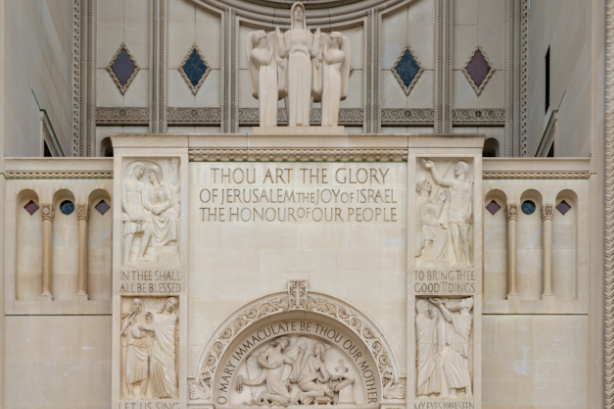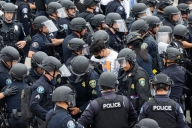You have /5 articles left.
Sign up for a free account or log in.

The Basilica of the National Shrine of the Immaculate Conception at Catholic University of America.
DoraDalton/Getty Images Signature
America’s left and right wing threaten academic freedom from different but predictable directions, befitting their diametrically opposed labels. Right-wing legislators try to eradicate critical race theory from public universities, while left-wing administrators capitulate to student complaints about conservative speakers.
This time, though, it was a conservative administration—that of Catholic University of America—that fired an instructor after a conservative student complained about a guest speaker discussing abortion. Specifically, the student complained that psychology lecturer Melissa Goldberg invited an abortion doula (someone who helps women through the process of obtaining and recovering from pregnancy terminations) to address her class. The student also objected to the speaker using trans-inclusive terms like “pregnant person” instead of “pregnant woman.” Finally, students protest against wokeness!
I shall likewise deviate from tradition and not lead with secular arguments for viewpoint diversity (which certainly do apply in this case), instead approaching this incident from a personal perspective as a practicing Catholic.
Faith strong enough to survive in the world is strong enough to encounter contrary ideas in the classroom. Viewpoint diversity is inherent to lived faith. Charitable work has exposed me to more varied opinions than are heard in faculty lounges. Helping in homeless shelters means rubbing shoulders with volunteers and clients from every walk of life. The volunteers include conservative Christians who think Catholics are insufficiently devout and secular leftists who would never set foot in even a progressive church. The clients are even more varied in personalities, beliefs and experiences. Charity, however, brings these disparate personalities together.
I venture that many CUA students contemplate service vocations, and working with people of every ideological extraction is part and parcel of humanitarian work. So, by all means, ask abortion doulas why they do what they do and why people seek their aid. Understanding aids cooperation.
Catholics need not endorse abortion to pursue other charitable endeavors alongside abortion-rights advocates. We should, however, understand how people committed to so many similar good works could nonetheless follow paths so at odds with our understanding of Catholic values. The purpose of understanding even sinful actions is not so that one can sin, but so that one can more fully love others in a world of sin. To quote a song that I learned in Franciscan elementary school,
“Oh, Master, grant that I may never seek,
So much to be consoled as to console,
To be understood, as to understand,
To be loved as to love with all my soul.”
If the Church teaches anything, it is the importance of loving even sinners, understanding them as humans in need of God’s grace and a community’s embrace. We accept them because God loves them more than we ever could.
My argument is no different from what I would say to left-wing law students protesting conservative speakers. The reality is that they share this world with conservatives, who currently hold a majority on the Supreme Court. This makes understanding conservative ideas essential for understanding our society and our legal system, and understanding the system is a prerequisite for changing it to more fully align with students’ own values.
I venture that many religious conservatives would endorse my reproach of left-wing students who shout down right-wing speakers, and I hope they see similar value in intellectual diversity that embraces left-wing views, even views sharply contradicting Church teaching. Those teachings should help us navigate a wide world, not isolate us from fellow humans.
Indeed, no less a religious authority than Jesus was willing to address opposing viewpoints. Some of his most famous parables on forgiveness and universal brotherhood were responses to skeptical questioning. The parable of the Good Samaritan begins with a legal scholar asking which people are or aren’t our brothers and sisters. Jesus could have shunned and shamed (biblical cancellation!) someone seeking confrontation, but instead he told a tale in which a person of a different religious background was a stranger’s true brother.
Or consider the trio of parables that includes the Prodigal Son. Jesus offered these parables after Pharisees chided him for associating with sinners and tax collectors (groups well represented in CUA’s Washington, D.C., environs). If Jesus can offer lessons on love and forgiveness after religious leaders questioned the sinful company that he kept, surely Catholic students can hear out someone who counsels desperate women through a hard experience that the Church condemns. If nothing else, Jesus would resolve moral disputes without firing low-paid, powerless lecturers.
Dissent on abortion is not even the only deviation from Catholic teaching found at CUA. The university welcomes students of all faiths, including Protestants who often dissent from Catholic doctrines on salvation and Jews and Muslims who reject Christ’s claim to divinity. If dissenters on the foundations of Catholic faith are welcome on campus, a guest speaker explaining views endorsed by roughly half of the general public poses no threat to the campus community and its moral character.
Of course, most Jews, Muslims and Protestants value human life, central to Catholic teaching on abortion. However, consider another threat to human life, one on which the Church also offers important teachings: war. CUA welcomes ROTC, which trains students to fight in wars that often deviate from Catholic teachings on just war. The university also has programs in public policy, human rights and political theory, which surely foster debates in which Catholic teaching is not the sole perspective considered. Somehow, this viewpoint diversity does not undermine the university’s Catholic identity.
Ultimately, to be Catholics in the world means understanding people and the motivations for their actions, even (especially?) sinful actions. Jesus didn’t isolate himself from critics or sinners, and neither should his followers, especially scholars using God’s gift of human reasoning to understand the world and teach students. Catholicism’s very name makes a bold claim to universalism, and leaders of Catholic institutions should live that claim via willingness to learn from all of human experience.

.jpeg?itok=aGrC82hx)





.jpg?itok=YusUVfky)
